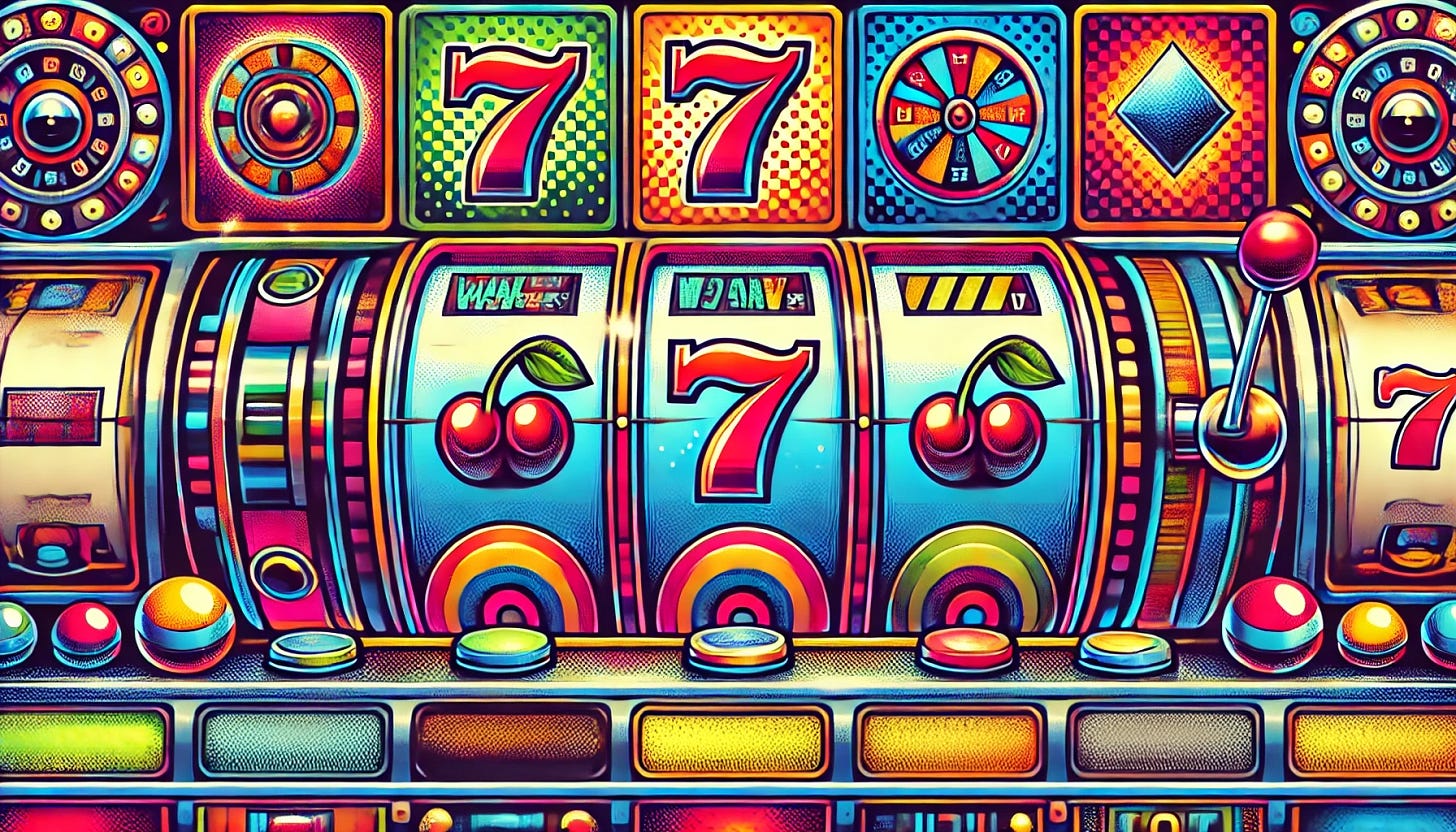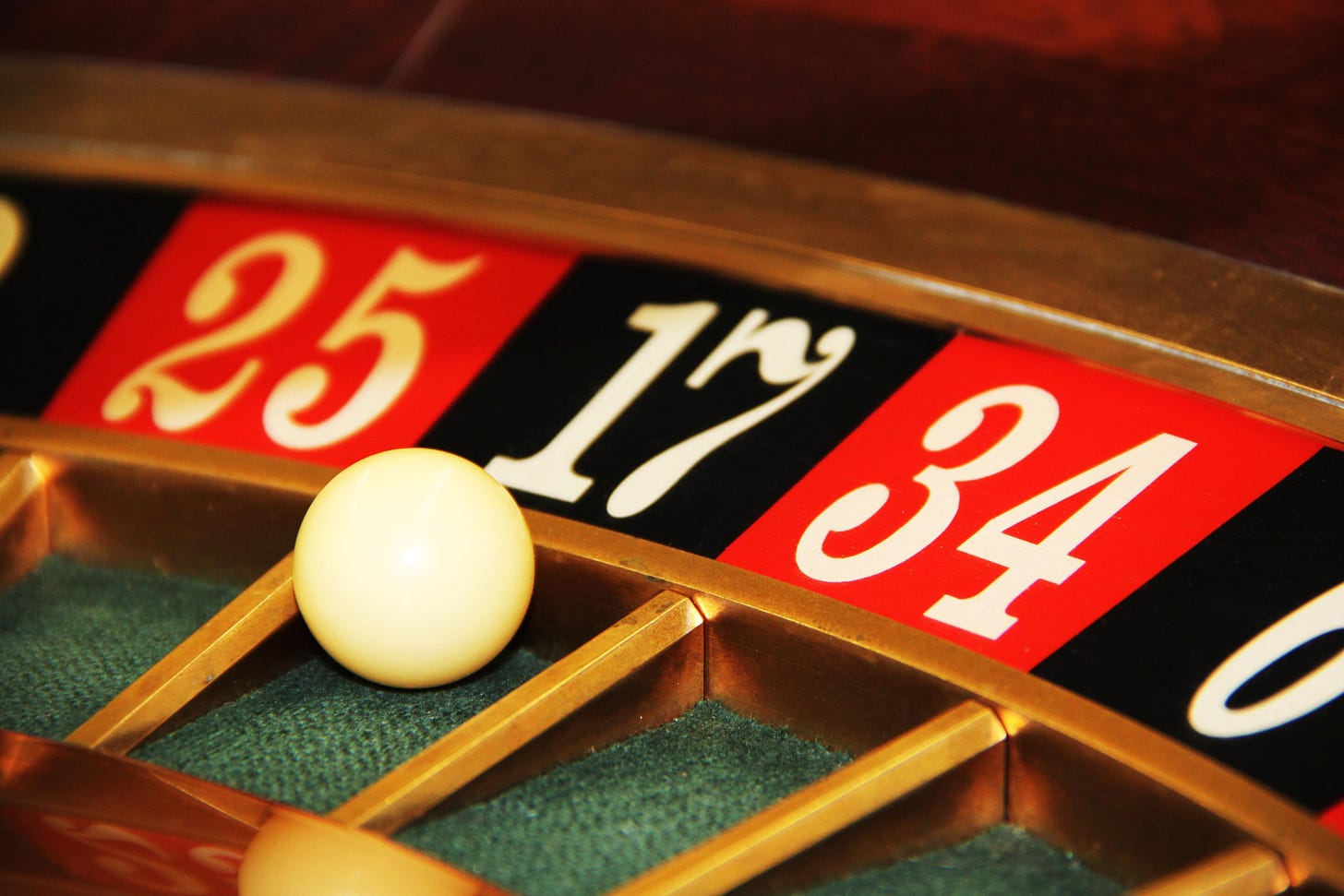During my medical training, I went to Peru with my now ex-wife to learn Spanish and to see how medical care is provided in a different part of the world. We visited an uncle of hers whom I had heard had suffered from problematic gambling. He gave us a tour of his picturesque town in Southern Peru and was quite excited to show us the new casino that had just been built. We later learned that his wife had forbidden him to enter this building under any circumstances. Once we were in the casino, he promptly ditched us and bunkered himself into a corner with a nickel slot machine. We couldn’t get him out. The look in his eyes was a combination of ecstatic and demonic. He appeared feverish. He was putting coins in the machine faster than I though was mechanically or physiologically possible. When we tried to convince him to leave, he didn’t appear to hear us.
Where did he go? What was happening? I wasn’t, at that point, aware that there even was such a thing as gambling addiction.
Is gambling truly an addiction? What about other “behavioral addictions” such as binge eating disorder, compulsive sexual behavior, porn addiction (which brought down a couple we were friends with – the husband completely lost interest in his wife), problematic internet use, problematic video game playing, kleptomania, and compulsive buying disorders?
Do we just call these things “addictions” as a shortcut, or do they truly overlap with addictions such as to opioids or alcohol?
Gambling Disorder as an Addiction
Gambling addiction can be profoundly destructive. It is associated with impaired functioning, reduced quality of life, and high rates of bankruptcy, divorce, and incarceration. In fact, 44% of those with gambling disorder report loss of savings or retirement funds and 22% report loss of homes, or automobiles, and pawning valuables. It can put you into poverty. People steal, they embezzle, and they write bad checks. Gambling disorder is associated with suicide, depression, anxiety disorders, as well as anti-social personality disorder. There is a huge overlap with substance use disorders, particularly alcohol. 35% to 63% of people seeking treatment for gambling disorder also screen positive for some type of drug addiction.
Back in the dark days when I was addicted to opioids and benzos, my brain had fundamentally changed in several ways, which are typical for addiction. I was extremely impulsive and would gobble down pills that I came across -- such as a bottle of Vicodin I stumbled upon right before my sister-in-law’s wedding, when I was supposed to be in charge of the kids. I prioritized short term gains, such as “I won’t feel so sick from opioid withdrawal if I take these pills” over long-term benefits of not killing myself with drugs or not getting into a ton of trouble. I filtered my conception of consequences – my certainty that “I won’t get caught” was an easy way to dismiss any qualms about the riskiness of my behavior. My moral compass completely broken and I would steal drugs from acquaintances. My thought processes fundamentally changed; I mostly thought about how I could procure opioids.
These are in line with our general understanding of the behaviors that occur when a person is addicted (to anything):
1) Continued engagement in activity despite adverse consequence
2) Diminished self-control over the behavior
3) Compulsive engagement
4) Cravings before participating in behavior
Gambling disorder and substance use disorders share many characteristics including cravings, tolerance, withdrawal, and failed attempts to quit. They are both “impulse control disorders”.
Many of the same physiological and brain changes (seen on functional neuroimaging) that occur with drug addiction also occur with gambling addiction. I’ll spare you the specific regions of the brain that are affected, except the nucleus accumbens, which is the dopamine reward section of our brains, which is critical in all addictions. Give me dopamine!
The affected parts of the brain include those that mediate risk-reward decision making (e.g., is this worth it?), inhibition (maybe I shouldn’t do this?), estimating (I probably won’t get caught) and planning (I could break into a pharmacy). We who are addicted tend to make disadvantageous decisions, and we select small, immediate rewards over delayed rewards such as “if I take Percocet I will feel spectacular” versus “I could pass my drug test next week if I don’t take it and get my medical license back”.
About half of the probability of developing Gambling Disorder is attributable to genetic factors – how ironic that it is a crap shoot whether you inherit these genes! In fact, 20% of first-degree relatives of those with a gambling disorder also had a gambling disorder. So, if problematic gambling runs in your family, be careful.
The shrinks say ‘yes, gambling is a disorder’
According to the beliefs of the addiction psychiatrists, gambling disorder is currently listed in the DSM-5 as a “substance-related addictive disorder”. This isn’t the case with other behavior addictions such as internet addiction, shopping addiction, and porn addiction though this is likely just a matter of time. According to the DSM-5, to qualify for “Gambling Disorder” you need to quality for 4 of 9 categories, which include (often similar to substance addictions): preoccupation, tolerance, inability to stop, irritability when unable to gamble, doing it to escape unpleasant emotional states, chasing losses, lie to family/friends about extent of gambling, put job or education in jeopardy, and need help paying for gambling losses.
How common is gambling disorder? One survey showed that 0.8% of people have lifetime prevalence and 1.3% have problematic gambling. This is a huge number given the wreckage that this disorder causes. Veterans, males, adolescents, people who are addicted to drugs, and young adults are particularly at risk.
What are the treatments?
Can Gambling Disorder be treated? What are the treatments?
As with all addictive disorders, psychotherapy is listed as a treatment, specifically cognitive behavioral therapy. Therapy can help you attain the skills needed to accurately process rewards and triggers as well as to help address the negative emotional states and psychiatric conditions that underpin the behaviors. We gamble, we eat, we spend – often out of unhappiness, and therapy can help with the unpleasant moods. Through therapy we learn life skills that can help us navigate difficult moods and tempting situations.
There are self-help groups which support many people, and which are generally thought to be helpful. The most widely recognized one for gambling is “Gamblers Anonymous.” I am a huge supporter of social support as a vital component of addiction treatment. Yet, if you have read any of my previous blogs, you know that I believe the “12-Step Programs” to be somewhat weird and cultlike, and generally off-putting to most people. “We all believe in God, a Higher Power, that will magically cure us of this medical disease known as addiction if we do enough chanting.” Blah blah. We urgently need to evolve beyond the 12-Step model to provide more useful social support for all addictions (including to eating – a huge problematic behavior for many).
Other treatment components are to develop alternative activities to compete with triggers for gambling disorder just was we do for regular drug addiction. If you can get pleasure from taking a walk in the woods with a friend, there is less need to seek out your dopamine from drugs or gambling. “Contingency management” is a treatment modality of offering rewards for better or worse behavior (e.g., for “clean” urine in drug treatment). This has some evidence behind it. As usual, the problem with contingency management is who is going to pay for it? I suggest the casinos should have to pay 10% of their profits toward Gambling Disorder treatment and toward a fund towards helping all of the people whose lives have been damaged to gambling.
No medications are yet approved for Gambling Disorder even though people are interested in investigating SSRIs. There is also interest in naltrexone which is an opioid receptor antagonist, which we use to treat alcohol and opioid addictions. There is some evidence that naltrexone can reduce gambling-related thoughts and behaviors in people with Gambling Disorder. They are also trying N-acetylcysteine, which is purportedly somewhat helpful in cannabis addiction as well as lithium (which we use for Bipolar Disorder).
Finally, there is some research being done into the use of CBD (cannabidiol) for gambling addiction. CBD is demonstrating remarkable potential in alleviating a host of addictive disorders.
Stay tuned!
***
As for policy issues, how accessible should gambling be to people, given that it is so addictive and potentially destructive? Does prohibiting it work? Most states have state-run lotteries - which is just a sanitized form of gambling, so it’s obviously OK in the eyes of society if it generates income for the states. Generally, as with most drugs, if you make things illegal, people tend to do them anyways, but they get much more dangerous.
We would rather have people going to the local casino than placing bets through organized crime. Yet, if we make it too accessible, aren’t more people with potential to get addicted going to get addicted? Won’t we just rope in vulnerable people? For this reason, casinos are not legal in all fifty states. I am not a huge fan of the ugly new Encore casino they just built, which blights the Boston skyline.
God only knows what is going to happen now that they have legalized sports betting – everyone who has a susceptibility is now much more likely to become addicted. I had a patient who lost her house because her daughter gambled away all of her money and she, despite knowing that her daughter was addicted to gambling, didn’t do enough to separate her assets. If you have a loved one who can’t control their gambling, please protect yourself. It doesn’t help that the casinos give away alcohol and have bank machines at the ready. Hopefully, these new avenues for gambling won’t create an epidemic of addiction and poverty. Young men are the people most vulnerable to Gambling Disorder and this seems like an awful set-up.







I discovered the hard way that if you tolerate one addiction in your partner, you will inadvertently give them permission for another. My alcoholic EX-boyfriend would finally go off his drinking binge, only to return to liquor stores because they also sold lottery tickets. Our relationship deteriorated when I realized he had an intention of relying on MY finances for either or both addictions. He stood outside and called me to bring down money for the taxi driver, because his cash was long gone. My account went over limit because he told the hotel clerk to just charge another drink to our hotel room. The final straw: he assumed I would come to the courthouse to pay his bail after an arrest for assault and battery, also related to alcohol.
Thoughts on GLP1 drugs for gambling addiction.